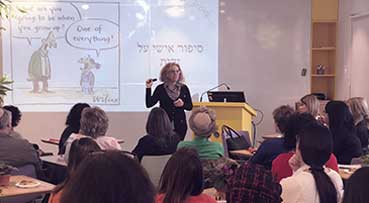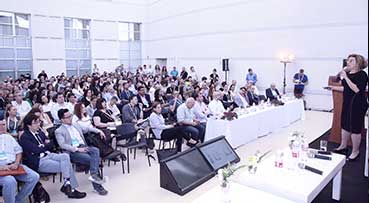The Work@War series delves into the future of work challenges faced by the Israeli workforce amid ongoing conflict. Today’s challenge focuses on the widespread return of employees from reserve duty. This situation presents a unique case study for the emerging global work trend of taking extended absences for reasons ranging from education and training to personal sabbaticals, family care, entrepreneurial ventures, or simply seeking personal growth. As we navigate the complexities of reintegrating reservists, we uncover strategies and insights crucial for any prolonged workplace absence. These lessons emphasize the essential roles of resilience, empathy, flexibility, and communication in building a supportive work environment. By drawing parallels between these varied reasons for extended leave, this article aims to offer a comprehensive guide on ensuring seamless and enriching returns to the workplace, highlighting the adaptability and understanding needed in today’s dynamic work culture.
In the normal course of business, we often overlook the challenges of transition back into the workforce from extended absences—be it military service, medical leave, sabbaticals, or caregiving responsibilities. We fail to appreciate that after any significant time away, be it months in the reserves, a year spent battling illness, or time off for personal growth, it is naive to expect businesses to seamlessly reintegrate employees as if nothing had changed.
We see it now in Israel, trying to reintegrate back into the workforce reservists who’ve been away for four months. The truth is, things did change. While they were away, organizations adapted to keep going under new conditions, embracing resilience and continuity as their response to adversity. This meant reorganizing, relocating, and readjusting to maintain operations, often without those who couldn’t work as usual. Now, as they return, it’s clear that neither they nor the workplace remains unchanged. It’s imperative that we find a way forward together, amidst ongoing uncertainty and the challenges of working in an ever-evolving work environment.
There are several crucial discussions to engage in when you reenter into the professional world from a prolonged absence, whether from military duty, health-related absences, or personal breaks:
The conversation with myself: what do I want?
Before diving back into the whirlwind of work, a crucial first step is to have an honest conversation with yourself. This introspection, more critical than any discussion with managers, colleagues, or even family, is about understanding your current desires and capabilities. It’s about pinpointing exactly what you’re seeking in terms of job role, work methodology, timing, location, or the need for flexibility.
The workplace is evolving rapidly, making this the perfect moment for reflection rather than long-term career planning or life goal setting, even if recent events have nudged you in that direction. Think of your career as a climbing wall, where your ambitions guide you upwards, but the immediate concern is choosing where to place your next step.
Ask yourself: Are you ready to commit fully, or are there reservations, possibly influenced by past experiences or future uncertainties? Consider the nature of your job, the expectations of those who rely on you, and how it all aligns with your current state of mind. Whether it’s a return to the familiar routine you crave, a reassessment of your work-life balance, or the exploration of a new career direction, the key is to pause and reflect on what truly matters to you at this juncture. Every decision is valid; what’s essential is taking the moment to ascertain your path forward.
The conversation with the organization: where am I? where are you?
Now that you’ve pinpointed your desires, it’s time to voice them to those who need to listen. Even if the feasibility remains uncertain or you’re unsure about the reception, this dialogue with your managers is crucial. The conversation serves dual purposes: firstly, to convey your aspirations, thoughts, and insights for the upcoming period, acknowledging that your managers may be navigating through their own set of challenges. It’s about aligning expectations and desires.
Secondly, it’s about understanding the organization’s current standing—its operations, challenges, and changes during your absence, and its plans moving forward. This authentic exchange is the foundation for building a mutual commitment, navigating through the fog of uncertainty to find a middle ground that benefits both you and the organization. As we revisit and reassess in the weeks and months ahead, this ongoing dialogue is critical for stability or adapting to new changes.
In today’s evolving work landscape, where work must carve its niche in life not only in times of conflict but also in a rapidly changing global economy, such genuine conversations have become indispensable. This shift reflects a broader trend towards deconstructing traditional roles and structures into more task-oriented and priority-based frameworks. The need for organizational adaptability, illustrated by the adjustments made for Work@War, is equally applicable in scenarios like global health crises, economic shifts, or technological innovation, necessitating temporary roles or alternative arrangements. This scenario opens doors for you to possibly re-enter the workforce under different terms that align with your current needs or aspirations. Whether it’s exploring new fields, adjusting work intensity for more family time, or embarking on specific projects, the flexibility in today’s job market encourages open discussions about desires and possibilities, fostering solutions that accommodate both individual and organizational needs amidst ongoing uncertainties.
The conversation with the team : reconnecting
After finalizing your return plan with management, it’s crucial to bring your team into the loop. Your colleagues may have borne the brunt of additional work during your absence. Now that you’re back, their dynamics and expectations may shift. Thus, engaging in a genuine team dialogue is essential to clarify any changes or adjustments needed, whether you require extra support, or if you’re resuming your role as usual. Sometimes, those who were gone forget that the time they were away also left its mark on others in the organization, altering the status quo. This conversation ensures everyone is on the same page, fostering a supportive and understanding work environment as you reintegrate, highlighting the universal need for empathy and flexibility in all forms of workplace reintegration.
The expectations: shaping the future
With a return plan in place, heading back to work might still feel uncertain. In Israel, the war is still ongoing, so the concept of “business as usual” seems distant. That too is a mark of the future of work since “business as usual” may shift due to a range of external factors like global crises, technological disruptions, and societal shifts, in addition to internal ones, including your own physical and mental well-being and that of those close to you. Prioritizing your health is crucial—keep a close watch and be ready to adjust your plan incrementally to fit changing circumstances.
As time passes, you might discover new desires and expectations, ones that resonate with a sense of purpose and belonging. This is a universal truth, irrespective of the reasons behind one’s absence—be it military duty, health challenges, personal growth, or caregiving responsibilities. You’ll seek to be part of a community that values compassion over profit, one that honors your dedication to personal or societal obligations just as you answered the call of duty, and where the organization’s priorities align with your own values.
This journey back to work is more than a simple return; it’s an opportunity to forge a new, meaningful existence for yourself and those around you. This dialogue isn’t just about coming back but about shaping a new reality that embraces change, fosters resilience, and cultivates a compassionate, adaptive society and workplace. Through this transition, we have the chance to implement bold changes, building a society and workforce that are braver, more flexible, and deeply humane, acknowledging the diverse experiences and contributions of all its members.

![large-AX1A2125-2[1] large-AX1A2125-2[1]](https://niritcohen.com/wp-content/uploads/elementor/thumbs/large-AX1A2125-21-pnzedcs72atx5aeurqytqdiihxixlq02re9mlz805s.jpg)






